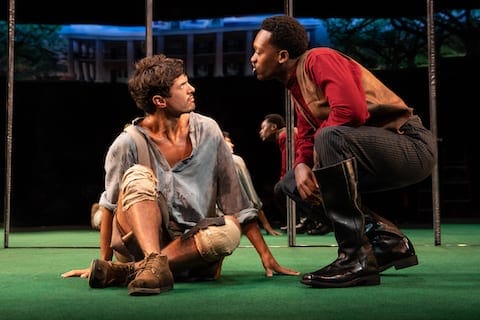
America is at war with itself. Our frontlines are littered with CAPS and too much punctuation (!!!), centuries-long discourse reduced and shoved into tweets and comments. Mostly, we rage inside echo chambers over slugging it out on the battlefield. How can anyone stand to listen when everyone knows they're right? Has everyone kind of lost their minds? Does anyone even feel like having sex anymore? And what is that f**king noise?!
These are just a few of the psychic rabbit holes explored in two of the most penetrating and audacious premieres on New York stages in recent memory. Slave Play, which opened at the Golden Theatre Oct. 6, and Heroes of the Fourth Turning, opening tonight at Playwrights Horizons, wrestle from opposing sides with the crisis of understanding that has always been destined to lead America past its breaking point. Whether the plays' revelations tumble out like so much hidden treasure, or gush and splatter like the entrails of a stuck deer, is up to the beholder. Either way, both practically dare audiences to avert their eyes.
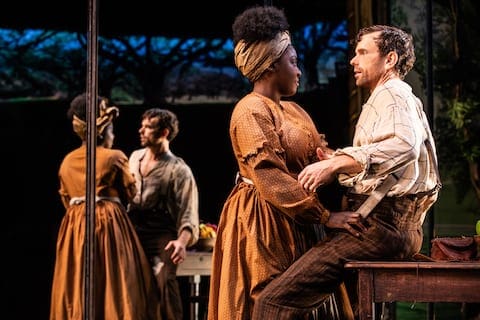
On one side is Jeremy O. Harris' provocative debut, which transferred from New York Theatre Workshop to Broadway amid momentary outcry from Black Twitter and various celebrity endorsements (Jake Gyllenhaal is a producer; Rihanna's attendance caused a media stir). Those who've read little about Slave Play and may have a chance to attend (the limited run ends January 5), have permission to look away; prior ignorance works in its favor. That the trauma of American slavery continues to resonate may be no surprise to more than half the country, but never has the excavation of its psychosexual consequences been so wildly entertaining and incisive.
The play's opening vignettes feature three interracial couples acting out what could be the first stilted scenes of master-and-slave porn in the style of Masterpiece Theatre. Power feels like slippery currency until clothes come off and the game is revealed: These aren't the bad old days but the here and now. The pairs are engaging in something called Antebellum Sexual Performance Therapy, designed to help the Black characters re-engage with white partners through role playing America's original sin. A broad-ranging and often riotous group therapy session reveals that sin's reverberations, at not just cosmic but psychic levels.
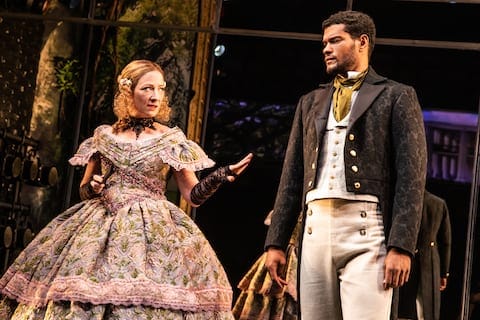
Harris sends up the hyper-sensitivity of liberal self-scrutiny (the scholars leading the session, an interracial lesbian couple, say things like “you are heard, you are affirmed, and I see you”) without undermining the gravity of what it reveals. He also points to the hypocrisies and blindspots that afflict people the closer they are to markers of power (i.e. being white, male, and/or straight). Director Robert O'Hara and a daring, excellent cast make staring painful history in the face unthinkably fun, with a production as saturated in color and light as it is awash in interior revelations.
Flung out at the edge of the world and shrouded in foreboding dark, the characters in Arbery's Heroes of the Fourth Turning turn their search for answers outward, toward God, the Catholic Church, and conservatism born of belief. Arbery is both brilliantly sensitive and subtly ruthless in humanizing characters almost guaranteed to be the presumed ideological enemies of his audience. Heroes offers a sustained look at what may feel like the far side of the moon to New York liberals; it doesn't pretend to bridge the gap, but rather presents a vivid depiction of who stands on the other side.
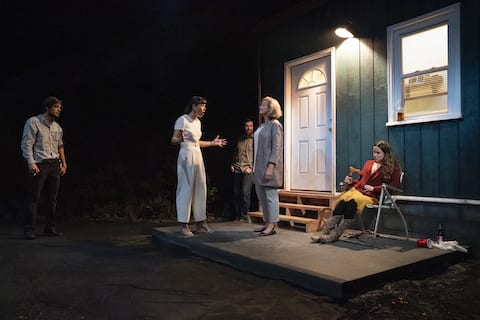
Party stragglers linger out back a remote cottage in the mountains of Wyoming, where a favorite professor has been named president of their Catholic alma mater. Some seem firmly committed to their learned faith, clear about its place in modern times and comforted by the moral shape it gives their lives. Others are less so, engaged in a desperate, sometimes messy search for any kind of assurance. In the world of Heroes, the sublimation of sexual impulse likewise has consequences — for the anti-abortion crusader who's terrified of motherhood, for the computer-addicted, sloppy drunk whose pleas for female attention are resoundingly self-serving.
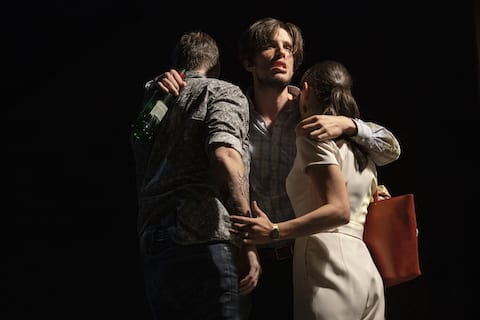
Even as talk turns to contemporary politics, the black void surrounding director Danya Taymor's production feels eerily out of time. Arbery's characters imagine themselves in a world where the word of God overshadows, and at times blinds them to, the facts of history and what lies beyond the dark. “They're using that original sin to take over,” says the firebrand afraid to be a mom (that sin being slavery). The left, she says, wants to “create a new America… which oppresses us in the same ways our ancestors oppressed them. As revenge.” Whiteness has become a trap, she insists, something none of them are allowed to be proud of anymore.
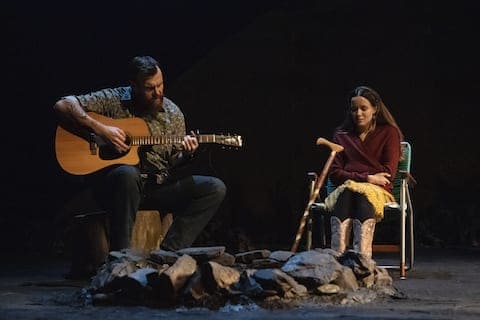
What's thrilling about Slave Play and Heroes isn't just that they present concurrent opposing sides of a roaring ideological debate, one that's both old as the country itself and has rarely felt more fierce. Harris and Arbery are each making the case for theatre's capacity to shatter barriers to understanding with flesh-and-blood storytelling — and not for the purpose of reaching any kind of agreement. These are the sort of plays that rip the ground out from under you; the plunge is somehow as entertaining as it is abjectly terrifying. That it can feel impossible to find a foothold afterward is their final masterful trick.
Recent theatre features…
Broadway's ‘Moulin Rouge!' Is a Dystopian Glitter Bomb of Empty Excess: REVIEW
At First I Didn't Think ‘Fairview' Was for Me: REVIEW
‘Hadestown' Wins Big in Tony Awards Marked by Calls for Empathy, Inclusion: FULL LIST OF WINNERS
Broadway's Sensational ‘Hadestown' Wrenches Myth into Modern Times: REVIEW
Keri Russell and Adam Driver Fizzle in Broadway's ‘Burn This': REVIEW
‘What the Constitution Means to Me' is the First Must-See Show of the Year: REVIEW
Temptations Musical ‘Ain't Too Proud' Makes a Play for Soul on Broadway: REVIEW
Follow Naveen Kumar on Twitter: @Mr_NaveenKumar
photos by matthew murphy and joan marcus



